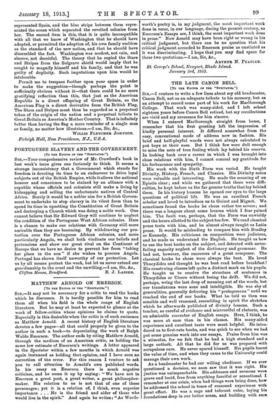MATTHEW ARNOLD ON EMERSON.
rro THE EDITOR OF THE "SrEcnrroa."1 SIR,—It may not be necessary for a critic to read the books which be discusses. It is hardly possible for him to read them all when his field is the whole range of English literature. But he may at least be expected to glance at the -work of fellow-critics whose opinions he claims to quote. Especially is this desirable when the critic is of such eminence as Matthew Arnold. A recent history of English literature devotes a few pages—all that could properly be given to the author in such a book—to depreciating the work of Ralph Waldo Emerson. The author ends by citing Matthew Arnold, through the medium of an American critic, as holding the same low estimate of Emerson's writings. A letter appeared in the Spectator within a few months in which Arnold was again instanced as holding that opinion, and I have seen no correction of the error. For this reason I venture to ask you to call attention to Arnold's own published words. In his essay on Emerson there is much negative criticism, and he sums it up by saying : "We have not in Emerson a great poet, a great writer, a great philosopher. maker. His relation to us is not that of one of these personages ; yet it is a relation of, I think, even superior importance. . . . He is the friend and aider of those who would live in the spirit." And again he writes : "As Words worth's poetry is, in my judgment, the most important work done in verse, in our language, during the present century, so Emerson's Essays are, I think, the most important work done in prose." Now Arnold may have been right or wrong in his critical judgment, but there can be no question that bis critical judgment accorded to Emerson praise as unstinted as it was discriminating. I hope that you may find space for these two quotations.—I am, Sir, &c.,
ARTHUR N. PEASLEE.
St. George's School, Newport, Rhode Island.
January 3rd, 1913.






































 Previous page
Previous page